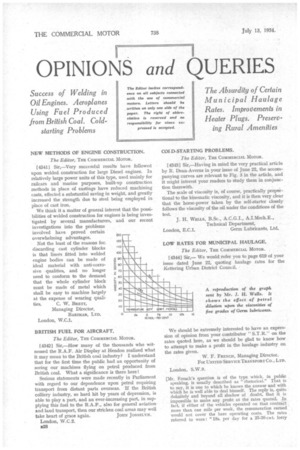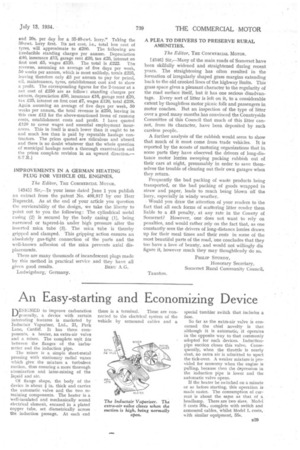OPINIONS and QUERIES
Page 42

Page 43

If you've noticed an error in this article please click here to report it so we can fix it.
Success of Welding in Oil Engines. Aeroplanes Using Fuel Produced from British Coal. Cold starting Problems The Absurdity of Certain Municipal Haulage Rates. Improvements in Heater Plugs. Preserv ing Rural Amenities
NEW METHODS OF ENGINE CONSTRUCTION.
The Editor, THE COMMERCIAL MOTOR.
[4341] Sir,—Very successful results have followed upon welded construction for large Diesel engines. In relatively large power units of this type, used mainly for railcars and marine purposes, built-up construction methods in place of castings have reduced machining costs, effected a substantial saving in weight, and greatly increased the strength due to steel being employed in place of cast iron.
Not the least of the reasons for. discarding cast cylinder blocks is that liners fitted into welded engine bodies can be made of ideal material with anti-corrosive qualities, and no longer need to conform to the demand that the whole cylinder block must be made of metal which shall be easy to machine largely at the expense of wearing quali ties. C. W. BRETT, Managing Director, BARIMAR, LTD. London, W.C.1.
BRITISH FUEL FOR AIRCRAFT, The Editor, TrrE COMMERCIAL MOTOR.
[4342] Sir,—How many of the thousands who witnessed the R.A.F. Air Display at Hendon realized what it may mean to the British coal industry? I understand that for the first time the public had an opportunity of seeing our machines flying on petrol produced from British coal. What a significance is there here I Serious statements were made recently in Parliament with regard to our dependence upon petrol requiring transport from distant parts overseas. If the British colliery industry, so hard hit by years of depression, is able to play a part, and an ever-increasing part, in supplying this fuel to the R.A.F., also for general aviation and land transport, then our stricken coal areas may well
take heart of grace again. Jonx JOSSELYN. London, W.C.2. COLD-STARTING PROBLEMS, The Editor, THE COMMERCIAL MOTOR.
[4343] Sir,—Having in mind the very practical article by R. Dean-Averns in your issue of June 22, the accompanying curves are relevant to Fig. 3 in the article, and it might interest your readers to study them in conjunction therewith.
The scale of viscosity is, of course, practically proportional to the kinematic viscosity, and it is then very clear that the horse-power taken by the self-starter closely follows the viscosity of the oil under the conditions of the test.
J. H. WELLS, B.Sc., A.C.G.I., A.I.Mech.E., Technical Department,
London, E.C.1. Germ Lubricants, Ltd.
LOW RATES FOR MUNICIPAL HAULAGE.
The Editor, THE COMMERCIAL MOTOR.
[4344] Sir,— We would refer you to page 619 of your issue dated June 22, quoting haulage rates for the Kettering Urban District Council.
We should be extremely interested to have an expression of opinion from your contributor " S.T.R." on the rates quoted here, as we should be glad to know how to attempt to make a profit in the haulage industry on the rates given.
W. F. FRENCH, Managing Director. For UNITED SERVICE TRANSPORT CO., LTD.
London, S.W.9.
[Mr. French's question is of the type which, in public speaking, is usually described as "rhetorical." That is to say, it is one to which he knows the answer and with which he is well able to deal himself. The reply is, quite definitely and beyond all shadow of doubt, that it is impossible to make any profit at the rates quoted, In fact, if either of the vehicles operated on that contract more than one mile per week, the remuneration earned would not cover the bare operating costs. The rates referred to were : "18s, per day for a 25-30-cwt. lorry and 20s. per day or a 35-40-cwt. lorry." Talting the 30-cwt. lorry first. Its net cost, i.e., total less cost of tyres, will approximate to £200. The following are irreducible standing charges per annum. Depreciation £40, insurance £12, garage rent £20, tax £25, interest on first cost £5, wages £120. The total is £222. The revenue, assuming an average of five days per week, 50 weeks per annum, which is most unlikely, totals £225, leaving therefore only £3 per annum to pay for petrol, c.ii, maintenance, tyres, establishment cost and to show a profit. The corresponding figures for the 2-tonner at a net cost of £250 are as follow : standing charges per annum, depreciation £50, insurance £16, garage rent £20, tax £25, interest on first cost £7, wages £120, total £238. Again assuming an average of five days per week, 50 weeks per annum, the total revenue is £250, leaving in this case £12 for the above-mentioned items of running costs, establishment costs and profit I have quoted £120 to cover wages and essential employment insurances. This in itself is much lower than it ought to be and much less than is paid by reputable haulage contractors. The prices quoted are ridiculous and absurd and there is no doubt whatever that the whole question of municipal haulage needs a thorough examination and the prices complete revision in an upward direction.-
IMPROVEMENTS IN A GERMAN HEATING PLUG FOR VEHICLE OIL ENGINES.
The Editor, THE COMMERCIAL MOTOR.
[4345] Sir,—Tn your issue dated June 1 you publish an extract from the patent No, 408,917 by our Herr Ruprecht. As at the end of your article you question the serviceability of the design, we take the liberty to point out to you the following : The cylindrical metal casing (2) is secured by the body casing (1), being narrowed or tapered-in under high pressure alter the inserted mica tube (3). The mica tube is thereby gripped and clamped. This gripping action ensures an absolutely gas-tight connection of the parts and the well-known adhesion of the mica prevents axial displacements.
There are many thousands of incandescent plugs made by this method in practical service And they have all given good results. BERU A.G. Ludwigsburg, Germany.
A PLEA TO DRIVERS TO PRESERVE RURAL AMENITIES.
The Editor, THE COMMERCIAL MOTOR.
[4346] Sir,---Many of the main roads of Somerset have been skilfully widened and straightened during recent years. The straightening has often resulted in the formation of irregularly shaped grass margins extending back to the old crooked lines of the highway limits. This grass space gives a pleasant character to the regularity of the road surface itself, but it has one serious disadvantage. Every sort of litter is left on it, to a considerable extent by thoughtless motor picnic folk and passengers in motor coaches. But an inspection of the type of litter over a good many months has convinced the Countryside Committee of this Council that much of this litter cannot, from its character, have been deposited by such careless people.
A further analysis of the rubbish would seem to show that much of it must come from trade vehicles. It is reported by the scouts of motoring organizations that in some parts they have observed the drivers of long-distance motor lorries sweeping packing rubbish out of their cars at night, presumably in order to save themselves the trouble of clearing out their own garages when they return.
Frequently the bad packing of waste products being transported, or the bad packing of goods wrapped in straw and paper, leads to much being blown off the lorry, especially in windy weather.
Would you draw the attention of your readers to the fact that all such forms of scattering litter render them liable to a £5 penalty, at any rate in the County of Somerset? However, one does not want to rely on penalties, and would rather rely on the fact that, as one constantly sees the drivers of long-distance lorries drawn up for their meal times and their rests in some of the most beautiful parts of the road, one concludes that they too have a love of beauty, and would not willingly din figure it, however much they may thoughtlessly do so.
PHILIP STURDY, Honorary Secretary, Somerset Rural Community Council.




























































































